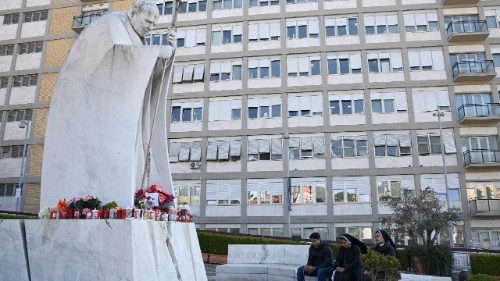“Let us watch out for one another! Let us beware of temptation of the father of lies and division, of the master of schism”
Note from the Secretariat of State to the German bishops

In view of the development of the German synodal journey so far, it must first of all be realised that a universal synodal journey is currently underway, which has been convened by the Holy Father. It is therefore necessary to respect this path of the universal Church and to avoid the impression that parallel initiatives are being carried out which are indifferent to the effort to “walk together”.
In this regard, it is worth taking up again some words of the Holy Father to the people of God in Germany: “Brothers and sisters, let us beware of one another! Let us beware of the temptation of the father of lies and division, the master of schism, who, in seeking an apparent good or an answer to a particular situation, ends up dismembering the body of the holy and faithful people of God” (1).
Respecting the concerns of some members of the Church in Germany, we “widen the tent” to continue the dialogue already begun, in the hope that it will be marked by respect and fraternal affection, taking into account the themes presented in the documents summarising the proposals.
However, it must be made clear from the outset that these themes are of varying relevance and cannot all be located at the same level. Some of them have aspects that cannot be discussed, but also aspects that can be the subject of an in-depth joint debate. With regard to others, however, there is no possibility of arriving at a different judgement, such as the following:
(a) Priestly ordination reserved to men.
“Although the doctrine of priestly ordination reserved only to men has been both preserved by the constant and widespread tradition of the Church and consistently taught by the Magisterium in the documents of the recent past, it is nevertheless considered debatable in our time in various places, or the Church’s decision not to admit women to this ordination is attributed a merely disciplinary significance. Therefore, in order to dispel all doubt on this important question, which concerns the divine constitution of the Church herself, I declare, by virtue of my office of strengthening the brethren (cf. Lk 22:32), that the Church has no authority to ordain women to the priesthood and that all the faithful of the Church must definitively abide by this decision” (2).
Pope Francis has explicitly reaffirmed the statement of St. John Paul II on several occasions. For example:
“With regard to the ordination of women to the priesthood, the Church has spoken, and she says: No – John Paul II said so, but in definitive terms. This door is closed” (3).
“With regard to the ordination of women in the Catholic Church, St. John Paul II has said the last clear word, and that stands. That is valid” (4).
“It is not a dogmatic definition, although it must be accepted by all. No one can publicly contradict it” (5).
We are dealing with a binding decision which is also subject to the jurisdictional power of the Pope, with precise disciplinary consequences, which are set out in the norms on infractions reserved to the Congregation for the Doctrine of the Faith (11 October 2021):
Art. 5.
The Congregation for the Doctrine of the Faith also reserves to itself the more serious offence of attempting the consecration of a woman:
1° If the person who attempts to confer sacred ordination or the woman who attempts to receive sacred ordination are believers in Christ subject to the CIC, they are liable to excommunication as a crime, the lifting of which is reserved to the Apostolic See according to can. 1379 § 3 CIC, the annulment of which is reserved to the Apostolic See.
2° If, on the other hand, the person who intends to confer Holy Orders or the woman who intends to receive them are Christian believers subject to the CCEO, they are to be punished by major excommunication, the cancellation of which is reserved to the Apostolic See.
Although today this question must be considered closed in the whole Church, the Holy Father Francis has formulated a reflection that helps to understand the meaning of this teaching and invites us to find other ways to encourage greater participation of women:
Claiming the legitimate rights of women on the basis of the firm conviction that men and women have equal dignity raises profound questions for the Church which challenge her and which cannot be superficially avoided. The priesthood reserved for men as a sign of Christ the Bridegroom, who gives himself in the Eucharist, is a matter which is not open to discussion, but it can give rise to particular conflicts if sacramental authority is too often confused with power. It must not be forgotten that when we speak of priestly authority, we are ‘on the level of function and not on the level of dignity and holiness’.
The ministerial priesthood is one of the means Jesus uses to serve his people, but the great dignity comes from baptism, which is accessible to all. The assimilation of the priest to Christ the Head – that is, as the primary source of grace – does not imply an elevation that places him at the head of all others. In the Church, functions do not establish “the superiority of some over others”. In fact, one woman, Mary, is more important than all the bishops. Even if the function of the ministerial priesthood is understood as “hierarchical”, it must be kept in mind that it is “entirely for the holiness of the members of Christ”. Its centre of gravity is not its power understood as dominion, but its authority to administer the sacrament of the Eucharist; this is the basis of its authority, which is always a service to the people. This is a great challenge for pastors and theologians, who could help to better recognise what this implies in relation to the possible role of women in the various spheres of the Church where important decisions are taken (6).
(b) Another issue on which a local Church has no possibility to take a different view concerns homosexual acts.
Indeed, even if it is recognised that from a subjective point of view there may be various factors which invite us not to judge people, this does not in any way change the assessment of the objective morality of these acts.
The constant teaching of the Church emphasises that “the objective moral evaluation of sexual relations between persons of the same sex is precisely and certainly established. Another question, which is not at issue here, is the degree of subjective moral credibility of such relationships in each individual case” (7).
From the Vatican, October 23, 2023.
Notes:
1 Pope Francis, Letter to the Pilgrim People of God in Germany, 29 June 2019, n. 10.
2 St John Paul II, Apostolic Letter, Ordinatio sacerdotalis on priestly ordination reserved to men only, 22 May 1994, n. 4.5.
3 Pope Francis, From the press conference during the return flight after World Youth Day in Rio de Janeiro (28 July 2013).
4 Pope Francis, From the Holy Father’s answer to Anna Kristina Kappelin for Sveriges TV during the return flight from the Apostolic Journey to Sweden (1 November 2016).
5 Pope Francis, “Responses” of the Holy Father “to the dubia of two cardinals” (1 July 1, 2023).
6 Pope Francis, Apostolic Exhortation Evangelii gaudium (24 November 2013), 104.
7 Congregation for the Doctrine of the Faith, Notification concerning certain writings of Fr. Marciano Vidal, C.Ss.R. (22 February 2001),
Related

Pope Francis spent a peaceful night
Exaudi Staff
02 March, 2025
1 min

Pope Francis has had a peaceful night
Exaudi Staff
25 February, 2025
1 min

What should the boyfriend or girlfriend I should find be like?
Patricia Jiménez Ramírez
24 February, 2025
4 min

The Pope spent a quiet night at Gemelli
Exaudi Staff
23 February, 2025
1 min
 (EN)
(EN)
 (ES)
(ES)
 (IT)
(IT)

